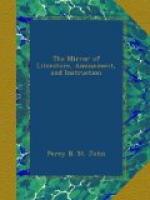Ere yet we had left the immediate vicinity of the house, we discovered a mournful group of women-servants weeping behind the hedge on our left, whither they had hurried to take their last look of that hearse which was carrying to the grave a kind and indulgent master, whose like they had no hope ever to look upon again.
The elevation of the road on the hill-side was such as to give us a full view of the valley, and we could observe that the summit of many of the little knolls at a distance, even those beyond the Tweed, were covered with small clusters of rustic gazers, all intent upon a spectacle equally calculated to move persons of every rank and description; and every now and then we found a little knot of spectators assembled by the way-side, whose motionless countenances and unbroken silence sufficiently testified the nature of their feelings.
As we approached the neat little village of Darnick, our attention was forcibly arrested by a very striking token of woe. On the top of an ancient tower—one of those, we believe, which Sir Walter has rendered classical—was placed a flag-staff, from which depended a broad, black banner of crape, or some other light material. There was not a breath of air to stir the film of a gossamer, so that light as the material seemed to be, it hung heavy and motionless—a sad and simple emblem, that eloquently spoke the general village sorrow. This we found more particularly expressed in detail, as we passed through the little place, by the many minuter insignia of mourning which the individual inhabitants had put on the fronts of their houses and shops—by the suspension of business—and by the respectful manner in which the young and the old, and people of both sexes, stood silently and reverently before their respective dwellings, wrapt in that all-absorbing sorrow which told how deeply he that was gone had rooted himself in their affections. When the hearse drew near to his own Melrose, the bell tolled sadly from the steeple of the church; and as we entered the street, we saw that here, as elsewhere, the inhabitants had vied with each other in unaffected and unpretending demonstrations of their individual affliction. In the little market-place we found the whole male population assembled, all decently dressed in deep mourning, drawn up in two lines, and standing with their hats off, silent and motionless. The effect of the procession when crossing the Fly Bridge over the Tweed, and still more when winding around that high and long sweep of the road which is immediately




